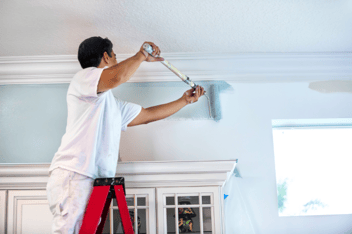
When selling your home, the goal is to sell it for the highest price possible. But for the buyer, they’re trying to get it for the lowest price possible. That’s where negotiation comes in.
Knowing how to negotiate as the seller of your home can be very overwhelming. How do you make a deal? What price do you ask for? What do you compromise on?
All of those details can feel very stressful. Luckily, we have some real estate negotiation tips that can help make the whole process a lot easier. Remember, like any great deal, preparation is always key.
10 Real Estate Negotiation Tips for Sellers
With home inspections, closing costs, counteroffers, and more, selling your home can be a daunting process. The right negotiation strategies can maximize your sale and ensure a smooth transaction.
#1. Work with an Experienced Real Estate Agent
As a seller, one of the best negotiation tactics you can use is working with a real estate agent. They know the market, aren’t emotionally attached to the home, and know how to negotiate the best deal for you.
Listing a home as “for sale by owner” might sound rewarding, but in most cases, homeowners tend to find the selling process overwhelming, not to mention that the legal aspects of selling your home are something you need to get right.
If you’re planning to sell your home, even if you think you want to sell on your own, scheduling a meeting with a real estate agent to talk about your home and gather any tips they might have is a great way to get the ball rolling.
#2. Set a Realistic Asking Price for Your House
You’ll also want to consider the market and the value of your home and set a realistic asking price. Going too high will not attract many buyers, and going too low will result in losing money you could use on your next house.
To find the best price for your house, look at what homes in your neighborhood are going for and see what features they offer. If your house has more rooms, you may ask for more than they are. You may ask less if your home is smaller or has few recent upgrades.
#3. Be Polite and Courteous
No matter what you’re asking for your home or how you plan to sell it, the best thing you can do is be courteous and show respect to potential buyers.
Being rude can make negotiations moot if the buyer leaves because they don’t like how you’re treating them. Try to over communicate where possible, always speak positively when dealing with a potential buyer, and respond as quickly as possible.
Read these Tips for a Successful Open House for more tips like this!
#4. Get a Home Inspection
Getting a home inspection is incredibly important when selling a home. If there are problems, you can fix them, or if that’s not an option, at least you know what you’re selling and can adjust your list price accordingly.
If you fix any problems that come up, that’s a bonus and may boost the price you can ask for your home. This is especially true if you do major renovations and replace old flooring or appliances with brand-new ones.
A home inspection also signals to the buyer that you’re taking the process seriously and ensures you won’t be surprised when a buyer brings up a problem they noticed with the house.
#5. Highlight Your Home's Unique Features
When negotiating the sale of your home, make sure to emphasize its unique features. Whether it's a newly renovated kitchen, a beautiful garden, or proximity to good schools, these details can make your property stand out.
Highlighting these aspects can justify your asking price and attract buyers who appreciate the added value. To reinforce your points, provide documentation, such as receipts for recent upgrades or energy bills showcasing energy-efficient improvements.
#6. Offer to Pay Closing Costs
If you’re dealing with a tricky buyer who is asking for a lot of concessions or keeps trying to lower your list price, offering to pay closing costs is a negotiation tactic you can use to seal the deal. This usually means paying appraisal fees, inspection costs, and attorney fees.
Many buyers aren’t swimming in cash after making the down payment and paying to move. Offering to pay these costs can help lead to a much quicker sale and may offset some of those items they wanted to keep talking down, helping you get a higher total price for the home.
#7. Put a Deadline on Your Counteroffer
During a sale, a buyer may submit an offer lower than you like, and then you’ll counter it. This puts you in a binding negotiation, and it’s considered unethical to accept any better offer during this time.
By putting an expiration date on your counteroffer, you give the buyer a deadline. If they don’t meet it, you can move on to other buyers who may be willing to pay more for your home.
The expiration date shouldn’t be too short, though, as it may insult the buyer and lead them to walk away. A week or two is usually a standard timeline
#8. Be Prepared to Compromise
While it’s important to aim for the best deal, be prepared to compromise. Flexibility can be a crucial factor in closing a sale. Consider what concessions you are willing to make, such as leaving certain appliances or furniture or offering a home warranty.
Knowing your non-negotiables versus areas where you can give a little can help facilitate a smoother negotiation process and make both parties feel satisfied with the outcome.
#9. Don’t Be Afraid to Reject the Offer
If an offer doesn’t meet your requirements, don’t be afraid to turn it down. Taking a sub-par offer won’t make you happy, and sellers’ regret is just as real as buyer’s remorse.
Make sure what a buyer is offering benefits you. If it doesn’t, say no. You don’t have to provide a counteroffer, and if you don’t, you can accept any better offer that comes along.
The buyer may come back with a better offer, or they may not. Either way, always make sure an offer meets your basic requirements, so you’ll be happy at the end of the whole process.
#10. Keep Your Cards Close
Keeping your cards close to the chest is one of the most basic rules when negotiating the sale of a house. Don’t discuss any stress or pressure you’re under with potential buyers. Don't let the buyer know if you need to make a quick sale or are looking for a specific price. They will likely use that to negotiate a lower price than you wanted in the first place.
Sell Your Home With an Experienced BlueWest Real Estate Agent
Negotiation is a difficult skill to master, but when you’re selling something as important as your home, you have to put your best foot forward.
If you need help negotiating the value of your home, contact one of our real estate agents at BlueWest Properties. With years of selling experience, our agents have what it takes to get you the best offer possible. We can’t wait to help!



